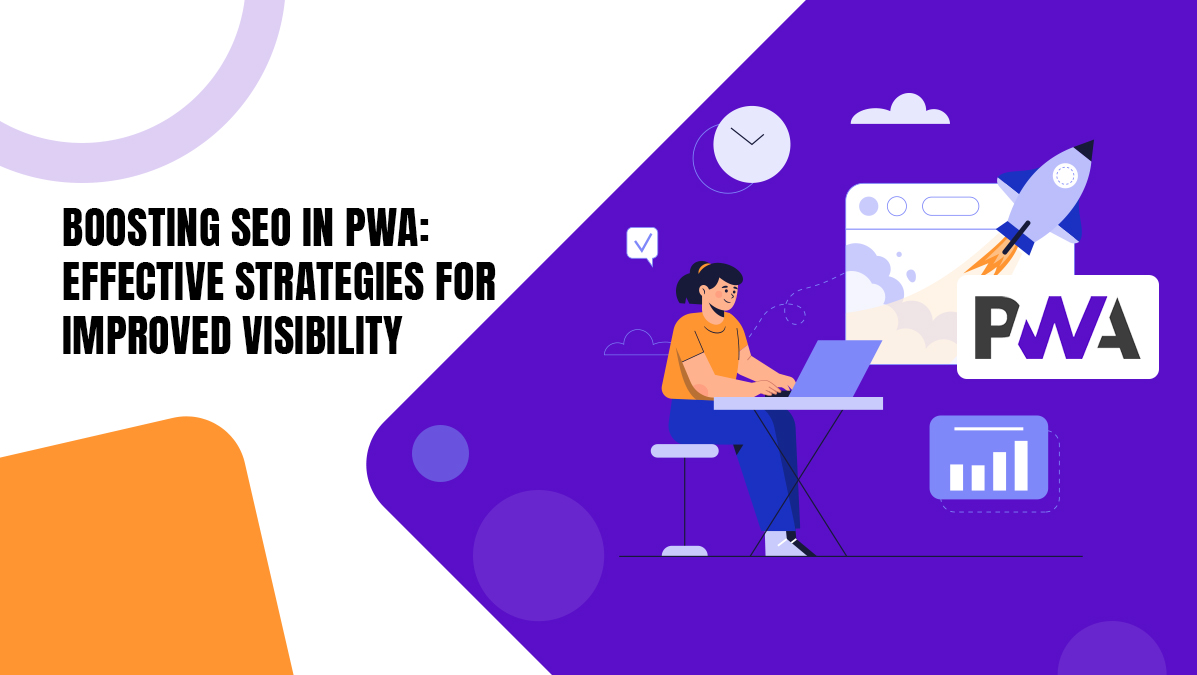According to Google’s research findings, nearly 80% of daily searches are performed exclusively on smartphones. This indicates a significant rise in mobile usage, highlighting the need for businesses to enhance their online presence on mobile devices. While many companies are opting for mobile apps to align with this trend, it is important to note that app-based SEO is restricted to app store rankings, making it challenging to improve app visibility in the competitive marketplace. Fortunately, a promising solution called Progressive Web Application (PWA) has emerged, offering enhanced mobile user experiences and addressing SEO challenges.
In this article, we will explore what PWA entails, its correlation with SEO, and how it can effectively boost search engine optimization.
Why is SEO Essential for Any Website?
- Expand your consumer base: Utilizing search engine optimization allows websites to secure prominent positions on the first and second pages of Google search results, leading to increased clicks and visibility. The higher a website ranks, the greater the influx of new visitors it can attract.
- Surpass your competition: Obtaining a higher ranking for your website provides a significant competitive edge, particularly when offering similar products. Customers tend to favor stores that appear nearer the top of search results, increasing the likelihood of immediate purchases. Thus, a strong SEO score becomes crucial in safeguarding your market share against rival businesses.
- Reduce expenses on alternative marketing strategies: Conventional marketing programs and tactics, such as influencer collaborations and social media advertising, often yield short-term results at high costs.
In contrast, implementing SEO strategies delivers long-term benefits by consistently attracting new consumers throughout the year.
Factors Affecting SEO Ranking in PWA
When it comes to PWA (Progressive Web App) websites, several factors influence SEO ranking. Firstly, content quality and relevance remain crucial for SEO ranking in PWA websites. Providing high-quality, informative, and engaging content that aligns with user intent helps improve search engine visibility.
PWA websites should also focus on optimizing keywords within their content. Strategic use of relevant keywords throughout the website, including within page titles, headings, and meta descriptions, helps search engines understand the website’s content and improve its ranking. Another important factor for PWA websites is site performance. As PWAs aim to provide fast and responsive user experiences, optimizing website speed, responsiveness, and overall performance is vital for SEO ranking. Ensuring quick loading times and efficient caching mechanisms can positively impact search engine visibility.
Additionally, PWA websites should consider implementing structured data markup. By using structured data, websites can provide additional context to search engines, leading to improved visibility in search results and potential rich snippets or enhanced search features. Backlinks from reputable websites and social signals, such as social media shares and engagement, also play a role in SEO ranking for PWA websites. Acquiring high-quality backlinks and generating social media activity can enhance the website’s authority and visibility in search results. Furthermore, implementing proper metadata and optimizing URLs in PWA websites contribute to better search engine visibility. Using descriptive and keyword-rich metadata, including title tags and meta descriptions, helps search engines understand the website’s content. Optimized URLs with relevant keywords can also improve SEO ranking.
At last, content quality, keyword optimization, site performance, structured data markup, backlinks, social signals, metadata, and URL optimization are significant factors that affect SEO ranking in PWA websites. By paying attention to these factors, PWA websites can enhance their search engine visibility and attract organic traffic.
What Is A Progressive Web Application (PWA)?
Progressive Web Apps (PWA) is a technology pioneered by Google that presents a unique blend of web pages and native applications. PWAs deliver captivating experiences akin to traditional apps within the confines of a mobile browser. This innovative amalgamation offers a host of remarkable features, including push notifications, the ability to create home screen shortcuts, and swift loading times.
Unlike conventional apps, Progressive Web Apps can be easily installed by end users with just a few clicks, eliminating the need to download them from an app store. Furthermore, PWAs possess the distinct advantage of functioning seamlessly in both online and offline modes, making them ideal for repeated visits, a capability that mobile websites and traditional apps cannot match.
SEO Benefits of Progressive Web Application
One of the remarkable qualities of Progressive Web Apps (PWA) is their ability to be easily shared through links and accessed via a web browser, resulting in a favourable relationship between PWA and SEO.
- Discoverable and Indexed: Like regular web pages, each individual page of a PWA possesses a unique URL. Consequently, search engine bots, including those from Google, can effortlessly crawl and index these pages. Furthermore, as PWAs are optimized for mobile devices, they contribute to expediting the indexing process.
- Enhance user engagement and reduce bounce rate: The introduction of Progressive Web App (PWA) features has revolutionized the concept of an online shopping website.
With convenient installation options like “add to home screen,” seamless updates, offline functionality, push notifications, and a full-screen view, visitors to the store can enjoy a browsing experience like that of a native app. By delivering an improved user experience, the store can attract more traffic and achieve higher rankings on Google.
- Accelerate website page loading time: As previously mentioned, PWAs offer an exceptionally fast loading speed, which is a critical factor in enhancing customer satisfaction. In comparison to regular websites, web apps, and mobile apps, PWAs excel in terms of loading speed.
- Increase website traffic significantly: By leveraging the capabilities of Progressive Web Apps (PWAs), the website can experience a significant boost in traffic. With PWAs being displayed directly on customers’ home screens, it encourages them to visit the site more frequently. Additionally, push notifications can be utilized to promote campaigns and serve as reminders for users to return to the site.
- Strengthen website security: The implementation of Progressive Web Applications requires enabling HTTPS, providing an additional layer of security that aligns with Google’s requirements for high-ranking websites. This consolidation of website security ensures a safer browsing experience for users.
- Enhance mobile-friendliness of the website: Progressive Web Apps introduce separate designs for mobile devices and desktops, resulting in an improved level of mobile-friendliness. This enhancement drives more traffic to the site and enables it to achieve higher search result rankings according to Google’s criteria.
Optimizing PWA for SEO
PWA offers great potential in improving user experience, boost sales revenue, and enhance SEO scores. However, understanding the benefits of Progressive Web Apps alone is not enough to fully leverage this technology. Here is the ultimate guide to making PWA SEO-friendly:
- Create custom URLs: Choosing professional and concise website links is essential. Even when appearing on the first or second pages of Google search results, unprofessional link addresses may deter customers from clicking. Optimal URLs should be relatively short, include the brand name, and incorporate relevant keywords to attract target customers.
- Utilize analysis tools: To improve SEO scores, merchants should identify areas of weakness and take appropriate action. Integrating the PWA with useful tools like Ubersuggest, Google Search Console, and Google Analytics provides a detailed analysis of the site’s performance and identifies any encountered issues.
- Test PWA performance: Thoroughly evaluate the final PWA store to ensure it meets PWA standards and delivers excellent performance. The Lighthouse PWA Analysis Tool is a popular choice for assessing PWA performance and quality.
- Optimize content for SEO: While developing a PWA can contribute to a high SEO score, additional steps must be taken by merchants. Focus on creating content that serves target customers, attracts new buyers, regularly updates information, and plans engaging campaigns. This approach encourages customers to engage with the site’s content, fostering revisits and potential orders.
Additional SEO Tips for Progressive Web Apps:
- Submitting the sitemap for proper crawling of pages.
- Eliminating the “#” symbol in PWA URLs and following regular SEO rules for URL creation.
- Using rel-canonical tags when sourcing content from different online resources to prevent content violations and potential penalties from Google.
- Redirecting desktop users from PWA URLs to canonical URLs.
- Testing the site using Google Search Console’s “Fetch as Google” feature to assess how it is viewed by Google bots.
- Checking blocked resources in the web app using Google Search Console’s “robots.txt Tester” to ensure proper crawling by Google bots.
- Optimizing the rendering of JavaScript files for pages to minimize embedded resources.
Conclusion,
Undoubtedly, building a Progressive Web App offers numerous advantages, including increased conversion rates, enhanced performance, and improved customer engagement. From an SEO perspective, PWAs contribute to increased traffic, longer user sessions, and reduced bounce rates. Overall, PWAs have a positive impact on SEO, and following the tips mentioned in this article will help in reaching target customers effectively.
At 18th DigiTech, a leading progressive web app development company, we excel in building and optimizing PWAs for SEO on Adobe Commerce. With a wealth of experience, we ensure your eCommerce brand shines online. Trust us for top-notch solutions to enhance your website’s SEO rankings while optimizing efficiency and saving costs.








 About 18th Digitech
About 18th Digitech Awards and Credentials
Awards and Credentials Our Partners
Our Partners Press/Events
Press/Events
